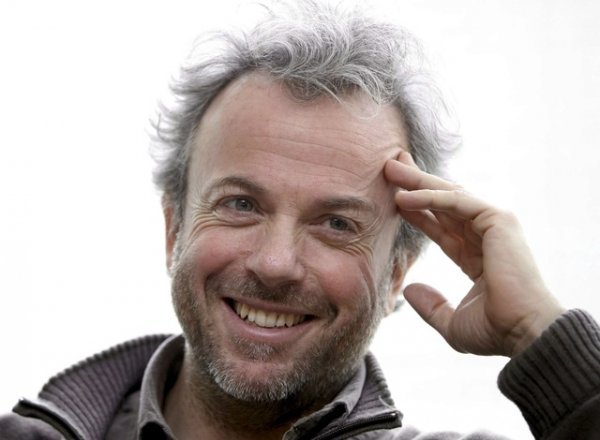
Après une tentative de suicide, Hugo, 20 ans, est réanimé et placé dans la même chambre d'hôpital que Blanche, une vieille dame au crépuscule de son existence. Entre ce jeune homme qui n'attend rien et cette femme qui mesure le prix de chaque instant, un dialogue se noue autour des grandes questions de la vie et de la mort, de Dieu, du destin et de la liberté, du bonheur, de l'amour... Ce qui aidera peut-être Hugo à trouver un sens à son existence. Surtout lorsque Blanche lui fera part de l'incroyable expérience qu'elle a vécue à l'âge de 17 ans et qui a transformé sa vie. Auteur d'une cinquantaine d'ouvrages vendus à plus de 7 millions d'exemplaires dans le monde, Frédéric Lenoir nous livre un roman profond et émouvant, dans la veine initiatique de L'Oracle della Luna ou de L'Âme du monde.
Author

3 June 1962. Birth in Madagascar.
- His parents return to France and move to the country to raise their four children, born in Morocco and Madagascar. 1970-1979. He moves to Paris. An unruly student, he is particularly ill-disposed to doing schoolwork and is sent to three different lycées (Victor Duruy, Buffon, Camille Sée). As a teenager he reads Hesse and Dostoyevsky, kindling his interest in existential questions. At 15 he develops a passion for philosophy after reading Plato’s Dialogues, and in astrology from reading books by André Barbault. 1980-1985. The Swiss psychologist Carl Gustav Jung has a profound effect on his intellectual direction, triggering a desire to study mankind’s great myths and religions. After an early fascination with Asian spirituality, in particular Tibetan Buddhism, discovered through the work of Chogyam Trungpa, he develops an interest in the Kabbalah and begins taking classes in the symbolism of Hebrew letters. He has no particular interest in studying Christianity, however. His Catholic upbringing, although very liberal, had focused too much on dogma and morality. Then, at 19, he reads the Gospels for the first time, and is amazed by them. He begins studying philosophy at the University of Fribourg, in Switzerland, with his childhood friend Emmanuel Rouvillois, who later becomes a monk by the name of Brother Samuel; there, he meets two crucial and outstanding professors: the Dominican philosopher Marie-Dominique Philippe (with whom he writes a book of interviews, Les trois sagesses, in 1994) and the philosopher and Talmud scholar Emmanuel Lévinas who, as a testament, leaves him a fine text on ethics in his book Le Temps de la responsabilité (1991). Parallel to his philosophy studies, he goes on a personal spiritual quest that leads him to spend several months in Israel and India, as well as in Christian hermitages and monasteries in France.
- As editor of the religion department at Editions Fayard, he publishes several books examining philosophical and spiritual themes.
- He resigns from his position as editor to devote more time to academic research and writing, and begins work on a doctoral thesis on Buddhism in the West at the Ecole des Hautes Etudes en Sciences Sociales.
- Passionate about ecological issues, he helps found the association ‘‘Environnement sans frontières.’’ In 2003 he publishes a book of interviews with his friend Hubert Reeves, who sounds the alarm on the risks threatening the planet. (Mal de Terre).
- He is appointed associate researcher at the Ecole des Hautes Etudes en Sciences Sociales (EHESS). Following in the footsteps of Edgar Morin, one of his intellectual mentors, he takes on the issue of religion in a multi-disciplinary approach combining philosophy, sociology and history.
- He writes l’Encyclopédie des religions, conceived and compiled with Ysé Tardan-Masquelier, (2500 pages, 2 volumes, 150 collaborators). 1996-2000. He writes for L’Express on a regular basis.
- He writes and directs an international study about sects for television with Lolande Cadrin-Rossignol. The documentary series, entitled ‘‘Sectes, mensonges et idéaux’’ (‘‘Sects, Lies and Ideals’’), is broadcast in France on the Cinquième channel and in numerous other countries. He also co-writes a documentary about the Dalai Lama that is broadcast on Canal +, and a series of three 52’ episodes on the Cinquième channel entitled ‘‘Dieu a changé d’adresse’’ (‘’God has changed his address’’). 1998-2005. He writes a number of books − some alone, others with Catherine David and Jean-Philippe de Tonnac − of interviews with such diverse figures as Abbé Pierre, Umberto Eco, Stephen Jay Gould, Jean Vanier, Hubert Reeves and Jean-Claude Carrière.